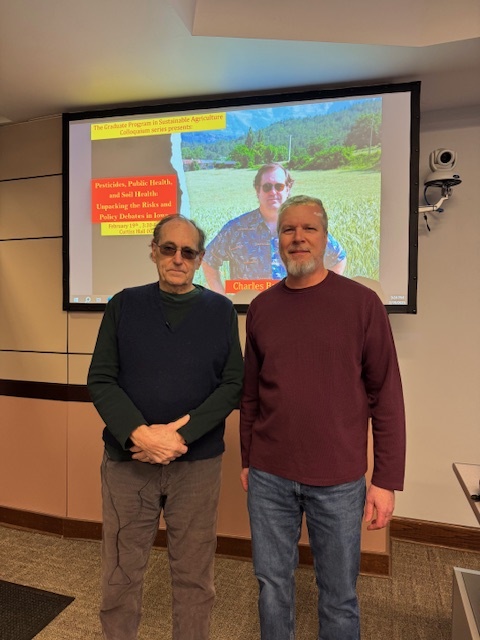Pesticide policy expert tours Iowa to educate people about pesticide immunity bill

Published: April 9, 2025
Category: Pesticides
Bayer lobbied the state’s legislature to pass legislation that would give them immunity from lawsuits over harm caused by their pesticides
Agriculture economist and pesticide policy expert Chuck Benbrook was invited by the Iowa Farmers Union to speak to Iowa citizens throughout the state about proposed legislation in the Iowa legislature that would give pesticide manufacturers immunity from lawsuits. Benbrook spoke at venues throughout Iowa over 12 days.
Below are some of Benbrook’s thoughts about the trip.
One sentiment came up everywhere: Iowans are not happy about the still-rising incidence of cancer in the state. It seemed almost everyone attending the Listening Sessions had a heartfelt story to tell about their fight with cancer (or fights; one woman attending the Fairfield session shared that a few months ago, she was diagnosed with her eighth cancer). Several people pointed out that lifestyle factors, including binge drinking, don’t explain why cancer in children is also on the rise.
People are frustrated, and worried and want someone to do something to find what is driving the disease in Iowa so steps can be taken to combat cancer in the state. It became clear that most people attending the meetings felt the way crops are grown and animals raised in Iowa is part of the problem, and hence must be part of the solution.
There were also many thoughtful, and a few impassioned statements about how the “system”—healthcare providers, researchers, ag scientists, regulators, politicians, state agencies—have failed to take meaningful steps to reduce the intensity of farm chemical use in Iowa (i.e. fertilizers and pesticides). One speaker pointed out that Iowa is supposed to excel at growing corn, beans, and hogs, not tumor cells.
One purpose of the pesticide immunity bill is to prohibit future lawsuits filed by farmers, landowners, or citizens who feel that a pesticide they bought and applied as instructed on the product label did not work as claimed and promised. Other lawsuits might be triggered by a pesticide registrant’s failure to warn on a pesticide label about the risk of damage to crops or other non-target vegetation, or harm to pets or livestock.
The other, more pressing and immediate purpose of the bill is to prohibit “failure to warn” claims in personal injury litigation. There are two high-dollar sets of personal injury cases moving through courts nationwide. One involves claims by pesticide handlers and applicators that their occupational exposure to Roundup herbicide contributed to their non-Hodgkin lymphoma. Around 175,000 such cases have been filed since 2016. Around 130,000 have been settled, dropped, or gone to trial, and over 40,000 plaintiffs are awaiting their day in court.
Bayer/Monsanto has had to cover large punitive damage awards in a few dozen cases, some over $100 million to a single plaintiff.
At the events I attended, I tried to explain some of the nuanced ways federal and state pesticide laws are supposed to work together to provide farmers safe and effective products, while also protecting the public, the environment, and pesticide applicators from “unreasonable adverse effects on man and the environment” (the core standard set forth in federal pesticide law).
The bill supported by the pesticide industry in Iowa, if passed and signed into law, would essentially end the ability of Iowans to successfully seek compensation for economic losses or personal injuries. That’s because the legislation provides pesticide manufacturers the opportunity to argue in court that their product was lawfully registered by the federal EPA, and if EPA approves a product label, the pesticide must be safe when applied in accord with label directions and requirements. This argument surfaces in essentially all pesticide litigation. Most judges understand why the Supreme Court rejected this argument in a precedent-setting case filed by Texas farmers in the early 2000s involving herbicide damage to rotational crops.
The proposed bill under review by the Iowa legislature would overrule Supreme Court precedence and undermine some of the key ways state regulators, scientists, and farmers currently work with the federal EPA to assure pesticides are available in states to meet special, and sometimes, emergency needs. But state and federal law is also responsible for assuring that pesticides, when applied in accord with labels, will be safe, even in unusual and sometimes high-exposure application scenarios that can arise in an individual state.
Organic & Non-GMO Insights April 2025




